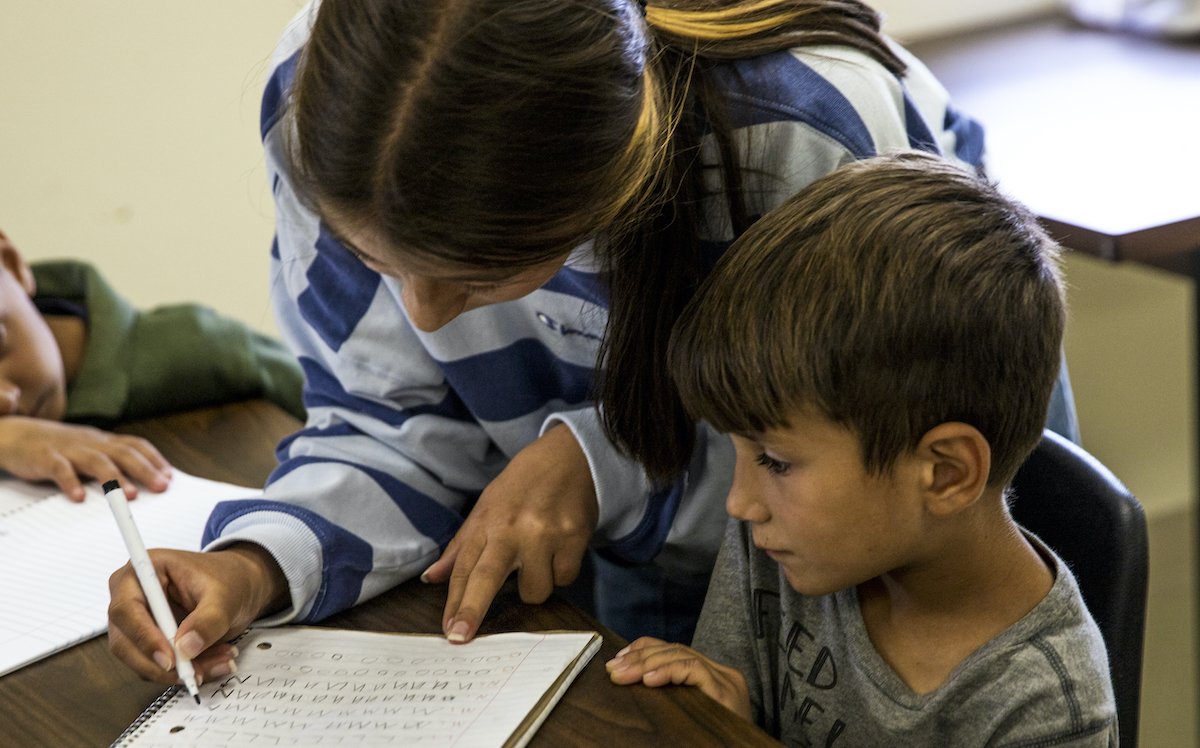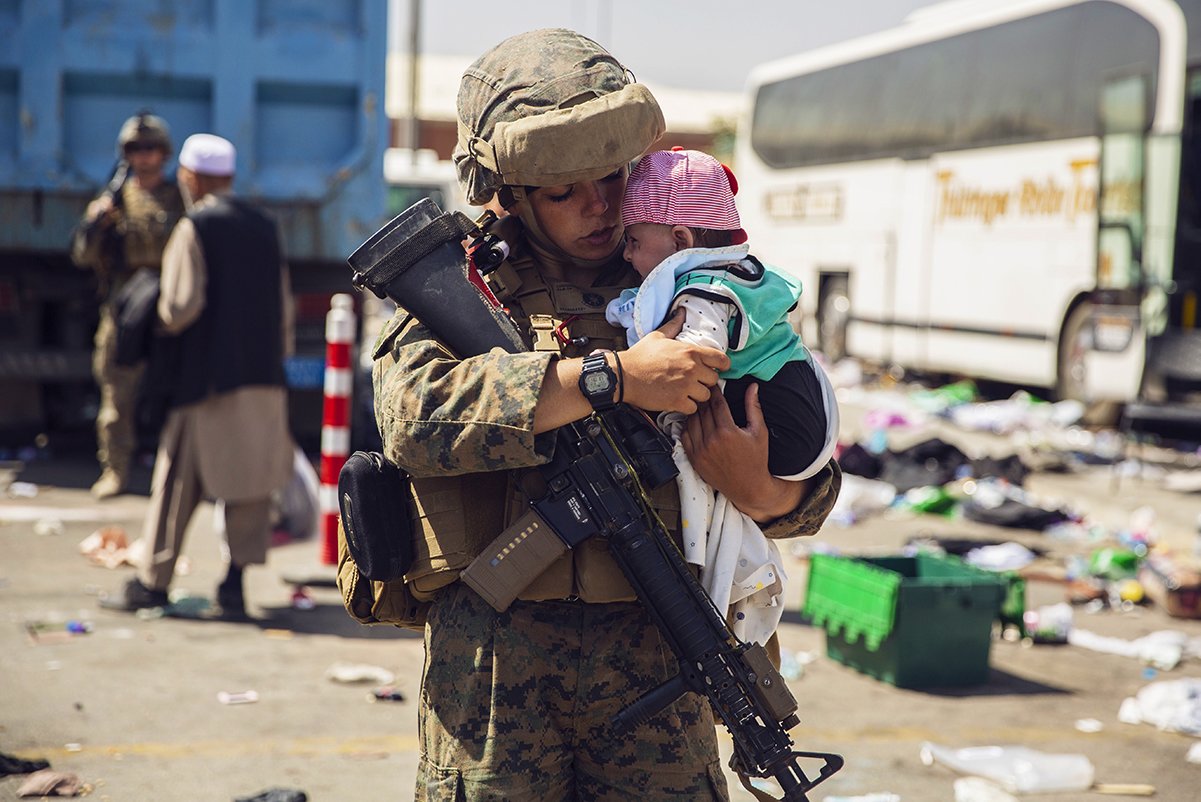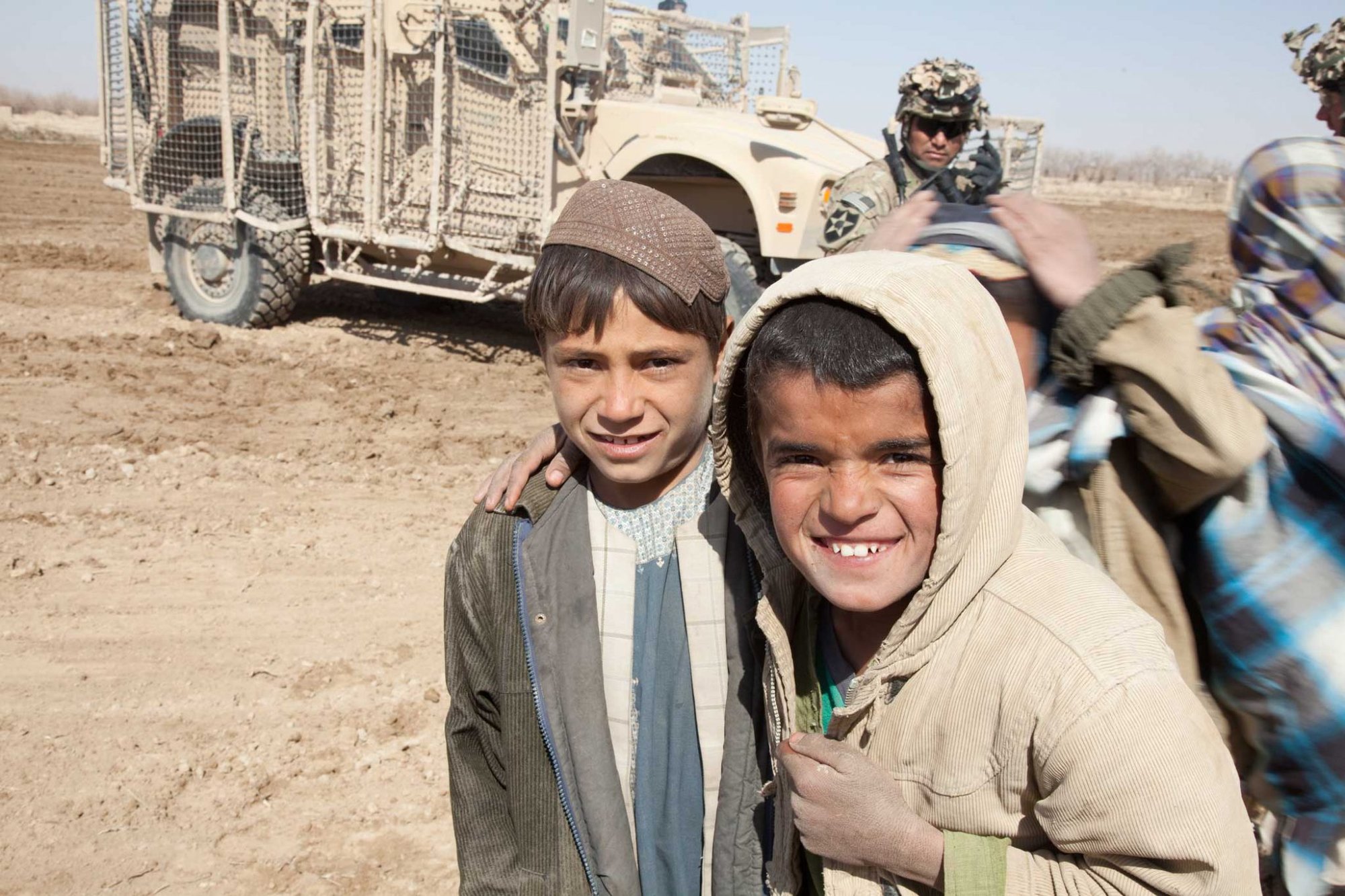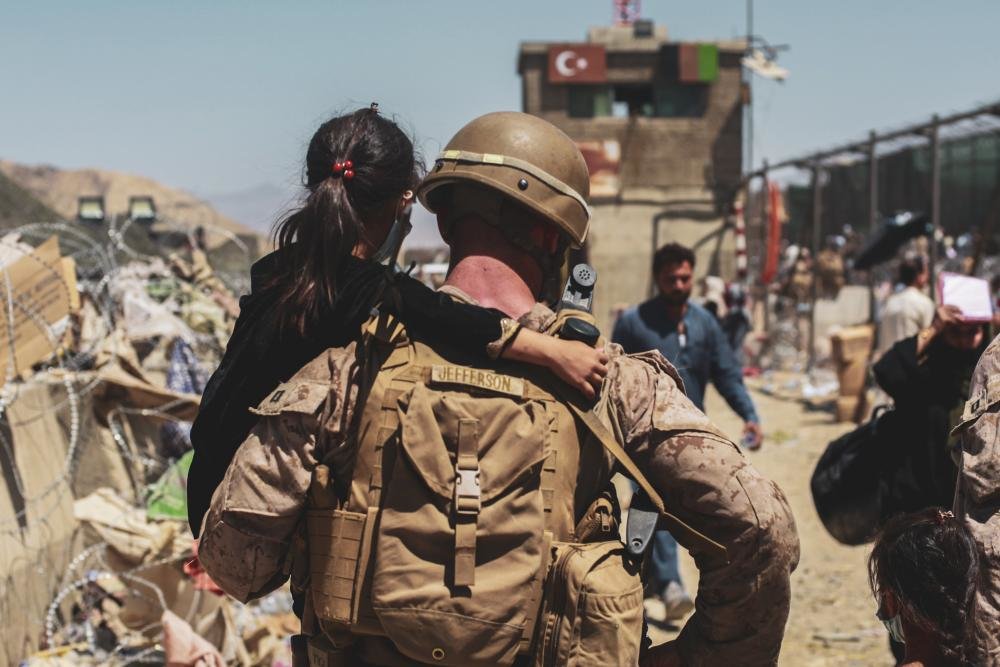These Children Fled Afghanistan Without Their Families, Now They’re Struggling in US Custody

An Afghan evacuee volunteer teaches another evacuee English on Fort McCoy, Wisconsin, Sept. 20, 2021. The classes assist Afghan evacuees, who are here as part of Operation Allies Welcome, as they transition to life in the United States. These informal lessons occur at various times across the installation. The Department of Defense, through U.S. Northern Command, and in support of the Department of Homeland Security, is providing transportation, temporary housing, medical screening, and general support for at least 50,000 Afghan evacuees at suitable facilities, in permanent or temporary structures, as quickly as possible. This initiative provides Afghan personnel essential support at secure locations outside Afghanistan. US Army photo by Spc. Rhianna Ballenge.
This story was originally published by ProPublica.
Seven months after the fall of Kabul, shelters in the U.S. caring for children evacuated without their parents are experiencing unprecedented violence while workers at the facilities have struggled to respond to the young Afghans’ trauma.
Some children have run away, punched employees and stopped eating. Others have tried to kill themselves. At one shelter, ProPublica has learned, some children reported being hurt by employees and sexually abused by other minors.
At least three shelters in Michigan and Illinois have shut down or paused operations after taking in large groups of Afghan children, prompting federal officials to transfer them from one facility to another, further upending their lives.

“This is not acceptable,” said Naheed Samadi Bahram, U.S. country director for the nonprofit Women for Afghan Women, which provides mentors to children in custody in New York. These children “left their homes with a dream to be stable, to be happy, to be safe. If we cannot offer that here in the U.S. that is a big failure.”
ProPublica reported in October on serious problems at a Chicago shelter that took in dozens of young Afghans. Since then, we’ve found that the troubles in the U.S. shelter system are more widespread.
This account is based on law enforcement records, internal documents and interviews with nearly two dozen people who have worked with or have talked with the children in facilities across the country, including shelter administrators and employees as well as interpreters, attorneys and volunteers.
Advocates for the children acknowledge that the Office of Refugee Resettlement — the federal agency responsible for overseeing the nation’s shelters for unaccompanied immigrant minors — is navigating an exceptional challenge. The haphazard evacuation of tens of thousands of people from Afghanistan last year as U.S. troops pulled out of the country left little time to prepare ORR facilities, which are accustomed to housing Central American children and teens. The COVID-19 pandemic created additional complications.
In all, some 1,400 unaccompanied Afghan minors were brought to the U.S. last year and placed in ORR custody. Of those, more than 1,200 have gone to live with sponsors, typically relatives or family friends.
Nearly all the remaining 190 are teenage boys with nobody here who can take them in. As of March 8, more than 80 Afghan children had been in ORR custody for at least five months, according to government data analyzed by the National Center for Youth Law. In a system that normally houses children for about a month, the young Afghans have been waiting in what seems like never-ending detention.
It’s unclear how or when children will be reunited with their families. The State Department is working to obtain travel documents for parents who remain in Afghanistan, a spokesperson said, but coordinating departures from Taliban-ruled Kabul has proven challenging.
The ORR said it has placed 56 of the 190 children in its custody into long-term or transitional foster care as of this week and is recruiting more families to take them in.
An ORR official, who spoke on the condition of anonymity, said the agency is doing its best to support the Afghan children by providing interpreters, mental health services, additional staffing and, in recent months, Afghan American mentors. But those efforts won’t “change the reality for a child that their parent is hiding from the Taliban or that their family has died or that they are grappling with some really terrible things that nobody should have to grapple with.”
“I do struggle to know what else we could be doing that we’ve already not been trying to do.”
And the ORR may soon face another challenge. With the Biden administration’s announcement Thursday that the U.S. will accept 100,000 Ukrainians fleeing war, people who work in the system are bracing for the children who may arrive without their parents.
On a cold and cloudy evening in early January, 19 boys were shuttled in vans to a shelter run by the nonprofit Samaritas in Grand Rapids, Michigan.
Employees at the shelter had heard that they might receive Afghan children but thought they’d have two or three weeks to prepare for their arrival.
Instead, they had 24 hours’ notice, according to one worker. (The ORR says it gave the shelter two weeks’ notice.) A federal emergency intake site that housed dozens of Afghan children almost 85 miles away in Albion, Michigan, had abruptly shut down, scattering children to facilities across the country, including Samaritas.
The shelter was not ready.
“Everything from the food to the reading material [to the] grievance procedures and the rules — everything that we had was set up for Central American kids,” one Samaritas employee said. “And now we were really screwed.”

On a given day, some 10,000 or so children and teens are in ORR custody around the country, the vast majority of them from Central America. Facilities that receive them tend to have employees who know their language and culture. Workers often speak Spanish or are Latin American immigrants or children of immigrants. They understand what motivates Central American teens to immigrate each year: pursuing a better education, fleeing gang violence and earning dollars to support families.
The children, too, often know what to expect because they’ve heard stories from friends and relatives who immigrated before them. They know it’ll be about 30 days in ORR custody before they’re sent to live with a sponsor.
“The Afghan kids were a completely different story,” said a former worker at a Pittsburgh shelter run by the nonprofit Holy Family Institute. “I felt so sorry for them. They’ve been there three, four months, and they still did not know if they would ever see their families again.”
The pivot to housing Afghan children left shelters flat-footed. Many needed prayer rugs, halal meat and connections to local Muslims who could lead Friday prayers. Even with interpreters who spoke Pashto or Dari, communication between children and employees was difficult, leading to misunderstandings and mistrust.
In the hours before the Afghan children arrived in Grand Rapids, the Samaritas worker said staff members were scrambling: “OK, like, what language do they speak? … It was a culture shock for them. It was a culture shock for us.”
There were many “unexpected complications,” said Samaritas Chief Operations Officer Kevin Van Den Bosch, but “we looked at the challenge, and said, ‘If not us, who is going to do it?’”
Employees at several shelters described the trauma among the youths as more severe than anything they’d seen. Children are desperate to call home to check on their parents and other relatives, some of whom worked for the U.S. government or for contractors and are now potential targets for the Taliban.
Some feel guilty for being in the U.S. while their families fear for their lives in Afghanistan.
After the Afghan children arrived at Samaritas, Grand Rapids police responded nearly every other day to calls for incidents like missing persons, suicide threats, fights and assaults. The police reports were unavailable, but internal shelter records document many of those incidents.

One boy put a rope around his neck, “acting like he wanted to hang himself.” Another day, a boy tried to suffocate another child with a plastic bag. A few days later, a worker found a boy scratching his forearm. He told her that “when his body is in pain, it prevents his head from thinking about his problems.”
Meanwhile, Michigan’s Department of Health and Human Services, which oversees the state’s Children’s Protective Services, is investigating allegations related to Samaritas, though it’s not clear what the allegations involve. A department spokesperson, Bob Wheaton, said the agency was prohibited by law from disclosing details.
Samaritas officials said that, while the nonprofit could not provide information about the allegations, the agency follows robust safety protocols to protect the youth in its care. That includes background checks, cameras at the facility and safety plans for children at risk of self-harm. “We take every, every allegation, or everything that a youth says seriously,” Van Den Bosch said, “and everything gets reported.”
Advocates said the struggles of some of the Afghan children should have been anticipated.
“Even children who have no prior traumatic experiences would begin to show signs of distress at this point, being in shelter care for this long,” said Saman Hamidi-Azar, who visits children in ORR facilities as a volunteer with Afghan Refugee Relief, a community organization in California. “There is nowhere to pinpoint blame except for the manner in which Afghanistan is evacuated: way too fast. No one was prepared on the ground here. No one could have expected what happened.”
In Chicago, ProPublica reported last fall on how the challenges involving Afghan children at a shelter operated by Heartland Human Care Services were exacerbated by the lack of on-site interpreters.
After the story was published, lawmakers called for an investigation and Heartland received interpreters.
But in the months that followed, police were called repeatedly to the facility. In January, officers arrested a 16-year-old boy accused of kicking and punching two workers. According to the police report, the boy said he was upset about being separated from his friends.
In a statement, Heartland said it’s not equipped to provide the mental health support some Afghan children need. “Heartland is not alone in our experience of how the severe lack of access to mental health resources dramatically impacted unaccompanied Afghan youth who arrived in this country last fall,” an official wrote.
The official said it stopped taking in children “after the challenging past few months” to support front-line staff through team-building and training. Heartland recently resumed operations, though at a reduced capacity.
Starr Commonwealth, the emergency intake site in Albion, seemed to get off to a better start. It offered a welcoming setting with residential cottages on a lush green campus when Afghan children arrived last fall. Unlike Heartland, it had Dari and Pashto interpreters on site from the outset.
But attorneys who visited children at Starr raised red flags early on. The site was too restrictive, they said, and children complained about a lack of physical activity and phones to call their families.
What’s more, because of its status as a federal emergency intake site, Starr wasn’t licensed by the state. Immigration advocates have long criticized the government’s use of these emergency facilities because they operate without independent state oversight.
The federal government had begun leasing the campus from a nonprofit with the same name last spring in response to large numbers of Central American children crossing the border. Starr later shifted focus to housing Afghan children.
As the children remained long past the short stays Starr was designed to accommodate, the local sheriff’s office started fielding calls about fights, runaways and suicidal behavior. A volunteer who often visited the facility — and asked not to be identified to avoid the risk of losing access to children in ORR custody — said children would tell her they “were crying all night long” and ask for prayers to help with depression.
She told her husband the shelter reminded her of a prison.
Before Starr shut down in early January, the sheriff’s office in Calhoun County received referrals for at least five child welfare allegations in the final three weeks, records show. In one case, a 16-year-old said two workers shoved and yelled at him. When interviewed by a deputy, one of the workers acknowledged yelling out of frustration but said he “does not put his hands” on the children.
The other worker was separately suspended after being accused of kicking a boy who was praying, according to a report. Neither led to charges. In the case in which the 16-year-old said he was shoved, the Calhoun County prosecutor’s office determined an assault did not take place. In the second, the child who said that he was kicked could not be located because he had been transferred elsewhere, Prosecuting Attorney David Gilbert said.

There were other troubles. Authorities responded to three allegations of sexual abuse or inappropriate behavior between children, including one from an 8-year-old boy who told a counselor that a 13-year-old boy came into his room at night and touched him. “He is scared and does not feel safe,” according to a sheriff’s department report. But by the time the prosecutors got this case, too, the children were no longer at Starr and could not be located, Gilbert said.
It’s unclear who employed the workers, as Starr was mostly staffed by PAE Applied Technologies, a federal contractor. A company representative declined to comment. Other workers came from a variety of federal agencies that loaned their services to the ORR.
A spokesperson for Starr said the nonprofit “did share a number of concerns” with both ORR and PAE. But Starr was “purely serving as a landlord,” she added, and “the government, not Starr, is solely responsible for programming and caring for children through its ORR program.”
Wheaton, from the state’s Department of Health and Human Services, said the agency had no jurisdiction over Starr but forwarded allegations to local law enforcement and federal authorities.
The ORR official said that the agency has a “zero-tolerance policy for abuse of any kind” and that employees accused of abuse are immediately terminated or put on administrative leave. Facilities also send allegations to local law enforcement, child protective services, the U.S. Department of Health and Human Services’ inspector general and the FBI.
At Starr and shelters around the country, workers said that they were overwhelmed. Some expressed frustration, calling the youth “spoiled” for asking for more phone time and Afghan food — which, over time, they received. Other employees suspected their colleagues were afraid of the children. One volunteer called the situation inside a shelter a “pressure cooker.”
Workers and others at several facilities said they heard children say they’d been told that if they misbehaved, they’d be sent back to Afghanistan.
ORR officials said any threats against children are unacceptable, and employees accused of maltreatment are placed on leave until all the details of what happened are understood.
Staffing shortages exacerbated tensions. In recent weeks, Samaritas administrators offered workers a $500 bonus if they picked up an extra shift, according to emails obtained by ProPublica.
“The depth and breadth of the need, and the sudden nature of it … put everybody in a really tough spot,” Sam Beals, Samaritas’ chief executive, said. “When I think of what these kids have gone through … it’s shocking they don’t act out more.”
Last week, Samaritas paused operations at the Grand Rapids shelter to hire and train staff.
The decision was made by the Lutheran Immigration and Refugee Services, which holds Samaritas’ grant with the ORR, according to federal officials. Lutheran Immigration did not respond to requests for comment.
Less than three months after they arrived at Samaritas, the Afghan children were on the move again, transferred to new facilities. Employees made it a point to prepare the children by taking them on virtual or physical tours when possible. The last child left the Samaritas shelter last weekend.

Melissa Adamson, an attorney with the National Center for Youth Law who is authorized to interview children in U.S. immigration custody, said the repeated transfers of the Afghan youth “further destabilizes their already fragile sense of security.”
Last fall, the ORR began offering special training for staff at shelters serving Afghan children. The agency also began allowing volunteer mentors from the Afghan American community to visit and provide emotional support to children, federal officials said.
In January, the ORR began sending Muslim and Afghan American mental health specialists to shelters through a program with the U.S. Committee for Refugees and Immigrants.
The changes made a difference, said Hamidi-Azar — whose organization is part of a coalition of Afghan American community groups, advocates and others that mobilized last fall to assist evacuees in the U.S. “You have to give credit where it’s due,” she said. “From government agencies to community activists, we have all been trying to find a way to make the situation better.”
After visiting children at one shelter in California, one Afghan American volunteer realized she could do more: She became a foster mom and welcomed two small boys — cousins — to her home.
The woman, who asked not to be identified to protect the children’s privacy, took time off work to bond with the boys and enroll them in the neighborhood school.
“They have adjusted well and are so happy to be in a home environment,” she said. “Being able to experience many firsts has been pretty special” — including a trip to the beach and a ride on a carousel.
Theirs is the kind of story advocates around the country want for Afghan children languishing in ORR custody. But the foster care system is backlogged, and finding homes for teenage boys is especially difficult. Foster parents often prefer and are licensed to care for younger children.
The ORR has partnered with organizations like the Muslim Foster Care Association to recruit more foster families. Approximately 80 Afghan families are awaiting licensing, a process that varies by state.
The foster mom in California thinks often about all the children still waiting for what’s next.
“As happy as I was that these boys were placed [with me], there were kids at the shelter that were devastated,” she said. “I know that one kid was crying: ‘Why? Why didn’t a family want me? What did I do?’”
If you or someone you know needs help, here are a few resources:
- Call the National Suicide Prevention Lifeline: 1-800-273-8255
- Text the Crisis Text Line from anywhere in the U.S. to reach a crisis counselor: 741741
Read Next: What Did We Leave Behind When We Left Afghanistan?

Coffee or Die is Black Rifle Coffee Company’s online lifestyle magazine. Launched in June 2018, the magazine covers a variety of topics that generally focus on the people, places, or things that are interesting, entertaining, or informative to America’s coffee drinkers — often going to dangerous or austere locations to report those stories.
BRCC and Bad Moon Print Press team up for an exclusive, limited-edition T-shirt design!
BRCC partners with Team Room Design for an exclusive T-shirt release!
Thirty Seconds Out has partnered with BRCC for an exclusive shirt design invoking the God of Winter.
Lucas O'Hara of Grizzly Forge has teamed up with BRCC for a badass, exclusive Shirt Club T-shirt design featuring his most popular knife and tiomahawk.
Coffee or Die sits down with one of the graphic designers behind Black Rifle Coffee's signature look and vibe.
Biden will award the Medal of Honor to a Vietnam War Army helicopter pilot who risked his life to save a reconnaissance team from almost certain death.
Ever wonder how much Jack Mandaville would f*ck sh*t up if he went back in time? The American Revolution didn't even see him coming.
A nearly 200-year-old West Point time capsule that at first appeared to yield little more than dust contains hidden treasure, the US Military Academy said.












